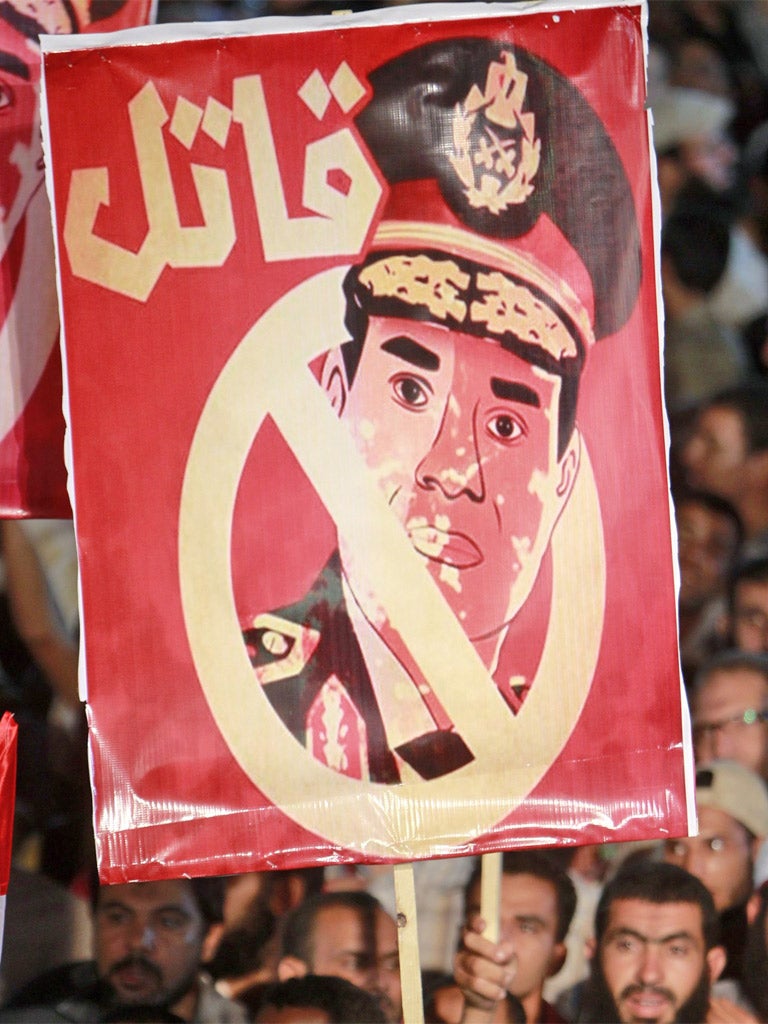In Egypt General al-Sisi is at a loss – but a massacre on Eid would bring too much infamy
The Brotherhood doesn't want to play by the army's script


No Muslim general wants to go down in history as the author of the Eid Massacre. That’s why many Egyptians last night suspected that their supposedly “interim” government’s self-declared failure to end the crisis with their Muslim Brotherhood enemies might still not be the ultimate collapse.
Abdul Fatah al-Sisi may be a very jolly general indeed – after all, he created this wondrous administration with himself as deputy prime minister – but sending in his goons against hundreds of thousands of Muslim worshippers on the eve of the feast marking the final day of Ramadan is not likely to commend itself to Egyptians, let alone to the Americans who supply the military with $1.5bn a year.
Of course, this may be a little naive. Armed, as he thinks he is, with the ‘people’s’ mandate, perhaps General al-Sisi thinks he can get away with corpses in the streets this week. But he has shown himself a patient man, and his ‘interim’ government’s assurance that it would still welcome international help to resolve the conflict suggests that he has not yet reached the point of no return. US deputy secretary of state William Burns – a diplomat who brings failure along in his brief case –may have departed, but the military are still trying to absorb John McCain’s description of their July 3 antics as a “coup”. Rarely has the Muslim Brotherhood had such American diplomatic support – and the Qataris are very frustrated that they were not allowed to meet Mohamed Morsi.
The trouble is that Morsi was the elected president, and when – apparently to his own great surprise – he was overthrown by the army (or the ‘popular will of the people’, depending on your point of view), his supporters simply had no plans for the future save for their demand that Morsi be reinstalled. So they blocked the roads of Cairo. General al-Sisi, assuming that the Brotherhood would tire of this tactic after a few days in the summer sun and a few mini-massacres, is now suffering the conundrum of all generals who find that their enemy doesn’t want to play by their script.
The Brotherhood knows al-Sisi does not want a mass slaughter. Al-Sisi knows the Americans do not want a mass slaughter. Perhaps some sort of ‘people power’ can be organised – now there’s a thought – to drive the Brotherhood away and leave the army unspattered with Brotherhood blood. After all, a lot of the snipers who have shot down Morsi’s supporters these last five weeks have been unidentified. But there are too many foreign diplomats, NGOs and journalists sniffing around for that to work on a large scale.
So which is more important? The will of ‘the people’ – those who hate Morsi – or the steadfastness of the Brotherhood for whom martyrdom (often in Egyptian prisons) has long been a characteristic? What about the dignity of the Egyptian army? About to set sail aboard his royal ship of exile, the ‘al-Mahrussa’ in 1952, King Farouk turned to the officers who had dethroned him. “Look after the army,” he told General Mohamed Naguib, soon to be deposed by Colonel Gamal-Abdul Nasser. Everyone loves the army.
And the Egyptian army rather loves itself. Its vast and obscenely bloated investments in real estate, banking and industry make this one of the richest Arab armies in one of the poorest Arab countries. It’s hardly in their interest to start a mini-war in the streets of Cairo. But the Brotherhood itself is bloated with arrogance, its record in power – with Morsi as their cypher – hardly worthy of the support of the ‘people’.
It’s worth remembering at this critical moment that Morsi’s government rejected proposals for free elections for trade unions, one of the principle definitions of any industrial democracy. John McCain may have identified the coup that overthrew Morsi, but he could scarcely claim that the Brotherhood were for the working man. Well, all this may be water under the Nile Bridge by this morning. But many probably hope the debate will go on– and that we shall see further foreigners arriving to ‘save’ Egypt.